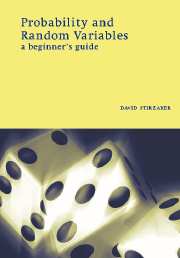Book contents
3 - Counting and gambling
Published online by Cambridge University Press: 05 June 2012
Summary
It is clear that the enormous variety which can be seen both in nature and in the actions of mankind, and which makes up the greater part of the beauty of the universe, arises from the many different ways in which objects are arranged or chosen. But it often happens that even the cleverest and best-informed men are guilty of that error of reasoning which logicians call the insufficient, or incomplete, enumeration of cases.
J. Bernoulli (ca. 1700)PREVIEW
We have seen in the previous chapter that many chance experiments have equally likely outcomes. In these problems many questions can be answered by merely counting the outcomes in events of interest. Moreover, quite often simple counting turns out to be useful and effective in more general circumstances.
In the following sections, therefore, we review the basic ideas about how to count things. We illustrate the theory with several famous examples, including birthday problems and lottery problems. In particular we solve the celebrated problem of the points. This problem has the honour of being the first to be solved using modern methods (by Blaise Pascal in 1654), and therefore marks the official birth of probability. A natural partner to it is the even more famous gambler's ruin problem. We conclude with a brief sketch of the history of chance, and some other famous problems.
Information
- Type
- Chapter
- Information
- Probability and Random VariablesA Beginner's Guide, pp. 93 - 128Publisher: Cambridge University PressPrint publication year: 1999
